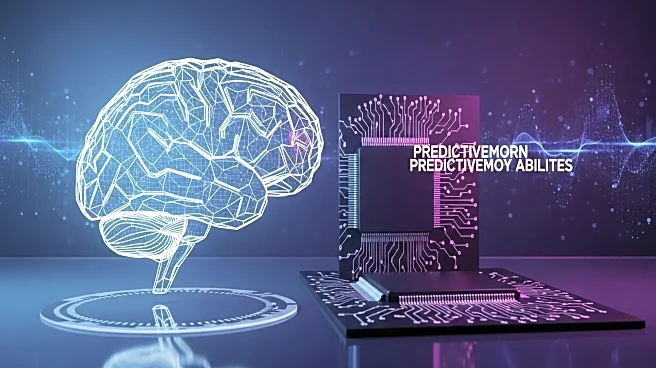What is the story about?
What's Happening?
A recent study has explored the metacognitive abilities of large language models (LLMs) in predicting human memory performance. The research involved a language-based memory task where both humans and LLMs provided memorability ratings for items, known as judgments of learning (JOLs). The study found a significant difference in predictive capabilities between humans and LLMs, such as GPT models. Humans demonstrated a positive relationship between JOLs and correct recall, indicating their ability to predict what will be remembered. In contrast, GPT models failed to accurately predict human memory performance across different contexts. The study manipulated sentence pair relatedness to assess the impact on JOLs, revealing that humans can make nuanced judgments about memorability, while LLMs lack this predictive accuracy.
Why It's Important?
The findings highlight a fundamental limitation in LLMs' ability to replicate human metacognitive processes, particularly in predicting memory performance. This shortcoming is significant for various applications, including education, where AI is increasingly used for personalized teaching methods. The inability of LLMs to recognize memory gaps and adjust teaching strategies can lead to student frustration. Moreover, the study underscores the importance of improving LLMs' monitoring capabilities to enhance human-AI interactions. Addressing these limitations could lead to more autonomous AI models, reducing the need for human control and improving engagement and retention in educational settings.
What's Next?
Future research may focus on enhancing LLMs' predictive capabilities through task-specific training or improved prompting strategies. Exploring methods to align LLMs with human metacognitive processes could improve their performance in educational and psychological applications. Additionally, advancements in AI models may address the current limitations, potentially leading to more reliable tools for predicting human memory performance. The study suggests that refining LLMs' ability to capture individual-level nuances is crucial for their integration across various domains.
Beyond the Headlines
The study introduces the concept of autonomy-control tradeoff, emphasizing the shift from human control to AI autonomy in task management. Strengthening LLMs' monitoring capabilities could lead to more autonomous models, enhancing interactions between humans and AI. The research also highlights the potential for LLMs to improve contextual consistency and recall through techniques like recursive summarization, offering a pathway toward approximating metacognitive regulation in AI models.















